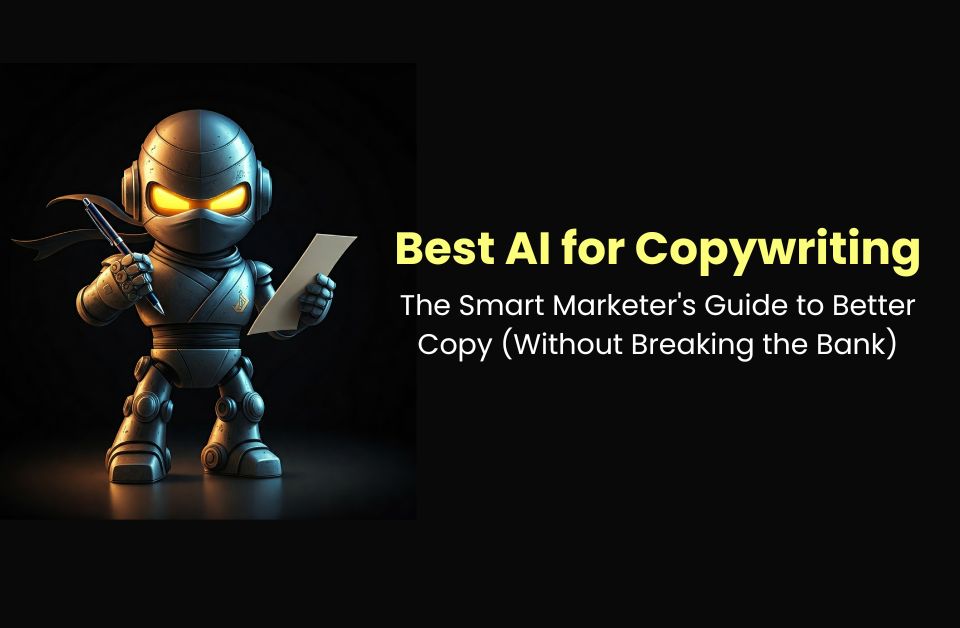- Understanding How To Use AI For SEO
- How AI Transforms Content Creation
- Leveraging AI for Keyword Research
- AI SEO Tools for Optimization
- Using AI to Write Compelling Content
- AI-Powered Content Analysis
- Best Practices for AI in SEO
- Overcoming Challenges in AI-Driven SEO
- The Future of AI in SEO
- AI For SEO Frequently Asked Questions
Understanding How To Use AI For SEO
AI has changed the game in SEO, and it’s time we all caught up. Gone are the days of manually sifting through mountains of data or guessing what might work. Now, AI does the heavy lifting, making SEO more efficient and effective than ever before.
AI-Powered SEO: A Game Changer
Remember when SEO felt like a never-ending guessing game? Well, those days are history. AI-powered SEO tools now analyze vast amounts of data in seconds, spotting patterns and trends that human eyes might miss. These smart-systems can predict which content will perform well, suggest optimizations, and even help create content that search engines love.
But here’s the kicker: AI doesn’t just make SEO faster – it makes it smarter. By learning from user behavior and search patterns, AI helps us understand what people want when they type something into Google. It’s like having a mind-reading assistant who knows exactly what your audience is looking for.
The Evolution of SEO Strategies
SEO has come a long way from keyword stuffing and link farms. Today’s SEO strategies are all about creating value for users while staying on the good side of search engine algorithms. AI helps us strike this balance by:
- Analyzing competitor content to find gaps in the market
- Suggesting topics that are trending but not oversaturated
- Optimizing content for voice search and featured snippets
With AI, we’re not just keeping up with SEO trends – we’re staying ahead of the curve. It’s like a crystal ball showing us where SEO is heading next.
How AI Transforms Content Creation
Creating content used to be a time-consuming process of research, writing, and endless revisions. AI is changing all that, making content creation faster and more targeted than ever before.
Streamlining the Content Creation Process
AI tools can now generate outlines, suggest topics, and even write drafts based on your input. This doesn’t mean AI is replacing human writers – far from it. Instead, it’s giving us a head start, handling the grunt work so we can focus on adding our unique human touch. For example, you might use an AI tool to generate a list of potential blog topics based on your keywords. From there, you can pick the ones that resonate with your brand voice and audience needs. It’s like having a brainstorming partner who never runs out of ideas.
Enhancing Content Quality with AI
But AI isn’t just about quantity – it’s about quality too. AI-powered tools can analyze your content for readability, SEO optimization, and emotional impact. They can suggest improvements to make your content more engaging and effective. Think of it as having an editor available 24/7, always ready to give you feedback and suggestions. This constant feedback loop helps you improve your writing skills over time, making you a better content creator in the long run.
Leveraging AI for Keyword Research
Keyword research is the foundation of any good SEO strategy. With AI, this process becomes not just easier but also more insightful.
Uncovering High-Value Keywords
AI tools can analyze search trends, competitor content, and user behavior to identify keywords that are popular and relevant to your specific audience. They can spot long-tail keywords you might have missed, opening up new opportunities for targeted content. It’s like having a metal detector for keywords – AI helps you find those hidden gems that can make your content shine in search results.
Understanding Search Intent with AI
But AI goes beyond just finding keywords – it helps us understand the intent behind those searches. By analyzing the context of searches and the content that performs well for each keyword, AI can give us insights into what users really want when they use a particular search term. This deeper understanding allows us to create content that genuinely answers user questions and solves their problems. It’s not just about getting traffic – it’s about getting the right traffic and providing real value to your audience.
AI SEO Tools for Optimization

Once you’ve created your content, AI can help you fine-tune it for maximum impact. From tweaking your on-page elements to suggesting structural changes, AI SEO tools are like having a team of optimization experts at your fingertips.
Content Optimization Techniques
AI can analyze your content against top-performing pages for your target keywords, suggesting improvements to help you compete. This might include recommendations for:
- Word count and readability
- Keyword density and placement
- Header structure and formatting
- Internal and external linking
It’s like having a coach who’s studied all the top players in your field and can tell you exactly what you need to do to compete at their level.
On-Page SEO Enhancements
Beyond the content itself, AI can help optimize all the technical elements of your page. This includes meta descriptions, alt tags, URL structures, and more. AI tools can even suggest schema markup to help search engines better understand your content. Think of it as giving your content a complete makeover, from head to toe, to make sure it looks its best for both users and search engines.
Using AI to Write Compelling Content

While AI can’t replace human creativity, it can certainly enhance it. AI writing tools are becoming increasingly sophisticated and can generate human-like text that can serve as a starting point for your content.
Crafting Engaging Headlines and Titles
Coming up with catchy headlines can be a challenge, but AI can help. By analyzing successful headlines in your niche, AI can generate title options that will likely grab attention and encourage clicks. It’s like having a headline brainstorming session with a partner who’s read every successful article in your industry.
Generating Content Briefs and Outlines
AI can create detailed content briefs and outlines based on your topic and target keywords. These outlines can include suggested subheadings, key points to cover, and even potential sources of information. This gives you a solid structure to work from, ensuring you cover all the important aspects of your topic. It’s like having a roadmap for your content, showing you the best route to take from introduction to conclusion.
AI-Powered Content Analysis
Once your content is live, AI doesn’t stop working. It continues to analyze performance and provide insights to help you improve.
Improving SEO Performance
AI tools can track your content’s performance in search results, monitor rankings for your target keywords, and compare your performance to competitors. They can identify which pieces of content are driving the most traffic and engagement, helping you understand what works best for your audience. This ongoing analysis is like having a dedicated SEO expert who’s always watching your content’s performance, ready to alert you to any changes or opportunities.
Identifying Content Gaps and Opportunities
AI can analyze your content library alongside search trends and competitor content to identify gaps in your coverage. It might spot topics you still need to cover or areas where your content could be more comprehensive. This helps you stay ahead of the curve, always knowing what to write about next. It’s like having a content strategy advisor who’s always one step ahead of the game.
Best Practices for AI in SEO
While AI is a powerful tool, it’s important to use it wisely. Here are some best practices to keep in mind as you incorporate AI into your SEO strategy.
Balancing AI and Human Creativity
AI is a tool, not a replacement for human creativity. Use AI to handle repetitive tasks and data analysis, but always add your unique perspective and voice to your content. Think of AI as your assistant, not your ghostwriter. It can help you work more efficiently, but the final product should always have your personal touch.
Maintaining Content Authenticity
With AI-generated content becoming more common, it’s important to maintain authenticity. Always review and edit AI-generated content to ensure it aligns with your brand voice and values. Remember, your audience comes to you for your unique perspective and expertise. AI can help you express that more efficiently but shouldn’t replace your authentic voice.
Overcoming Challenges in AI-Driven SEO
While AI offers many benefits for SEO, it also comes with its own set of challenges. Being aware of these can help you use AI more effectively.
Addressing AI Limitations
AI is incredibly powerful, but it’s not perfect. If not properly trained, it can make mistakes, misinterpret data, or produce biased results. Always double-check AI-generated content and recommendations before implementing them. It’s like having a brilliant intern – their work can be incredibly helpful. However, you still need to review and approve everything before it goes live.
Staying Ahead of Search Engine Algorithm Updates
Search engines constantly update their algorithms, and some updates specifically target AI-generated content. Stay informed about these updates and adjust your AI usage accordingly. This might mean tweaking how you use AI tools or changing your content strategy. It’s like playing a never-ending game of chess with search engines – you need to stay flexible and adapt your strategy as the rules change.
The Future of AI in SEO

As AI technology continues to advance, its role in SEO will only grow. Staying informed about emerging trends can help you stay ahead of the curve.
Emerging AI Technologies for SEO
Keep an eye out for new AI technologies that could impact SEO. This might include:
- Natural Language Processing (NLP) advancements that help search engines better understand content
- AI-powered voice search optimization
- Predictive analytics for user behavior
These emerging technologies are like the next generation of SEO tools – getting familiar with them early can give you a significant advantage.
Preparing for the AI-Driven SEO Landscape
As AI becomes more prevalent in SEO, developing skills that complement AI rather than compete with it is important. Focus on areas where humans still have an edge, such as:
- Creative storytelling
- Emotional intelligence and understanding of user needs
- Strategic thinking and brand alignment
Think of it as future-proofing your SEO skills. Focusing on these uniquely human abilities will make you valuable even as AI takes over more routine tasks.
In conclusion, AI is transforming the world of SEO, making it more efficient, data-driven, and effective than ever before. Learning to use AI tools effectively allows you to streamline your SEO processes, create better content, and stay ahead of the competition. Remember, AI is a powerful tool but is most effective when combined with human creativity and strategic thinking. So embrace AI, but remember to bring your unique human perspective to the table. That’s the real secret to SEO success in the AI age.
AI For SEO Frequently Asked Questions
How can I use AI to improve my SEO results?
You can leverage AI by using tools that automate keyword research, analyze user behavior, and optimize content for search engines. AI can also help generate content ideas and provide insights into what topics resonate with your audience.
Are there any disadvantages to using AI for SEO?
While AI can enhance efficiency, it may produce generic content lacking creativity. Additionally, over-reliance on AI tools without human oversight can lead to inaccuracies and missed opportunities for personalized engagement.
Can AI help with keyword research?
Absolutely! AI tools can analyze vast amounts of data to identify high-value keywords based on current trends and user intent. This helps you focus on terms that are more likely to drive traffic to your site.
Is AI taking over SEO jobs?
While AI is transforming SEO, it is not replacing SEO professionals. Instead, it acts as a powerful assistant that automates repetitive tasks, allowing marketers to focus on strategy and creativity.
What are some best practices for using AI in SEO?
Best practices include balancing AI automation with human creativity, regularly reviewing AI-generated content for quality, and staying updated on algorithm changes to adapt your strategies accordingly.
How does AI impact content creation?
AI streamlines the content creation process by generating ideas, outlines, and even drafts. It enhances the quality of content by analyzing readability and engagement metrics, helping you create more effective pieces.
What should I be cautious about when using AI for SEO?
Be cautious of over-reliance on AI-generated recommendations without human review. Always ensure that your content aligns with your brand voice and provides real value to your audience. Additionally, stay informed about ethical considerations regarding data privacy.


